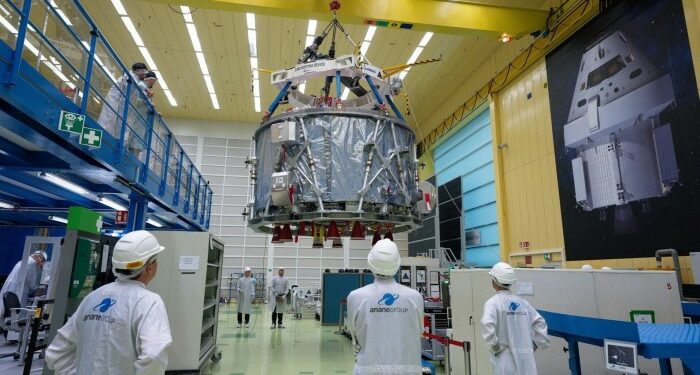Roula Khalaf, Editor of the FT, selects her favourite stories in this weekly newsletter.
The European Space Agency is preparing for potential cancellation by US President Donald Trump of key elements of the Artemis Moon programme, the vehicle for many of Europe’s lunar ambitions.
Daniel Neuenschwander, the ESA’s head of robotic and human exploration, said the US was a crucial partner for Europe in space exploration but it was obvious there were “changes taking place on the US side”.
“We will sit with our Nasa counterparts and assess what it means for our co-operation . . . I’m aware that these discussions may become more transactional than in the past. Europe will be prepared.”
The comments come as members of Elon Musk’s team from the so-called Department of Government Efficiency (Doge) have begun to review spending at Nasa, including the US space agency’s near-$100bn Artemis programme that aims to beat China in returning humans to the Moon.
Last week Boeing told staff that some 200 jobs could be cut as a result of expected changes to the heavily over-budget Space Launch System rocket, the primary launch vehicle for Artemis missions.
The Lunar Gateway, a space station designed to orbit the Moon and a flagship for international collaboration in Artemis, also looks vulnerable, according to a former Nasa official who spoke on condition of anonymity.
Many major components on Gateway are being supplied by Europe, Japan, Canada and the United Arab Emirates. “As you look at this administration it is easy to see why and how Gateway could be in jeopardy,” said the former Nasa official.
The Lunar Gateway has come in for heavy criticism in the US from former Nasa chiefs © Nasa
ESA officials met the agency’s member states last week to discuss the situation ahead of a ministerial meeting in November, at which budgets for the next three years will be decided.
Alternatives could include stepping up collaboration with India, which has ambitions to land astronauts on the Moon by 2040, or accelerating plans for European robotic explorers on the lunar surface.
Europe is heavily reliant on the Artemis programme to help fulfil its lunar ambitions. In the next three-year funding round, lunar programmes are expected to represent the largest share of the requested exploration budget.
The ESA is supplying the service module for the Orion crew capsule to be launched on the SLS, as well as key habitation elements of the Gateway. In return, it was expecting Nasa to fly three European astronauts to the Gateway.
The Gateway in particular has come in for heavy criticism in the US from former Nasa chiefs and even from Apollo 11 astronaut Buzz Aldrin. Critics have questioned the need for a space station orbiting the Moon, given that Musk has said his giant Starship rocket — currently in the middle of a test flight programme — will be designed to stay in lunar orbit for several months at a time.
“With Starship, it’s questionable whether it is needed,” the former official said.
Yet Starship is not ready to fly to the Moon, and is even further from carrying crew. Waiting for Starship to be ready could jeopardise US ambitions to beat China in sending humans back to the Moon.
“There are those who say SLS and Orion are the only realistic chance to get there before the Chinese,” the former Nasa official said.
But the SLS is still several years late and considerably over budget: it is expected to cost $23bn to 2028. Boeing’s management of the programmes has come under fire from the US government auditor, which has estimated that a single launch could cost more than $4bn.
One option would be to fund only those SLS missions already contracted, the former official said. “At this point you pivot towards a more affordable, sustainable commercial programme. We could beat China but still terminate the old way of doing business.”
During a visit from Japanese Prime Minister Shigeru Ishiba this month, Trump indicated he would continue collaboration with Japan on space. Last year, former president Joe Biden promised that the first non-Americans to reach the moon would be Japanese rather than European astronauts.
But even in Japan some officials remain concerned. “We are carefully examining the situation,” a government official said. “We do not know what will happen.”
Nasa told the Financial Times that international partnerships remained “an important part of the Artemis campaign”.
Both the International Space Station and Gateway had been enabled by investments from international partnerships, the agency said. “These partnerships strengthen US global leadership in exploration and support American industry by creating opportunities for innovation and expansion.”
Source link : http://www.bing.com/news/apiclick.aspx?ref=FexRss&aid=&tid=67b849565e14410aaa53fbfa5ba36e88&url=https%3A%2F%2Fwww.ft.com%2Fcontent%2Fe14e3a07-3b5f-447e-a190-04955bb71dae&c=15564176921673641506&mkt=de-de
Author :
Publish date : 2025-02-20 21:00:00
Copyright for syndicated content belongs to the linked Source.



